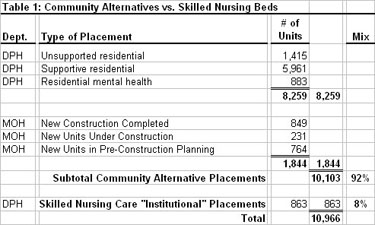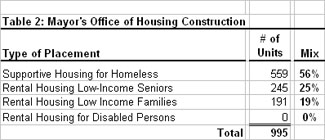
About the Chambers Lawsuit
Disparity Between Current Community-Based
Alternatives and Laguna Honda's Skilled Nursing Beds
U.S. District Court Testimony Needed
U.S. District Court Class Action Notice
New Chambers Lawsuit Rebuttal
Residents of Laguna Honda Hospital, former residents of Laguna Honda, family members, and legal guardians and other caregivers of Laguna Honda residents need to write to the U.S. District Court now to support San Francisco’s contention that the City complies with disability rights laws requiring community-based care.
On February 1, 2007, San Francisco's Long-Term Care Coordinating Council (LTCCC) — a policy advisory body who are all appointed by San Francisco Mayor Gavin Newsom — released a document dealing with whether the City's budget process is developing community-based long-term care services for seniors and adults with disabilities. The LTCCC noted that “key factors in determining whether or not the City is providing a real choice of community living alternatives is how existing departmental funds are allocated.”
Given the fact that 92% of the City's current placement options are community-based, and not institutional-based, and since only 8% of the City's long-term care “beds” are in skilled nursing facility “institutions,” it appears the City is complying with the U.S. Supreme Court’s Olmstead decision. In Appendix B to the LTCCC's February 1 document, the LTCCC noted “The Court cautioned that the ADA [Americans with Disabilities Act] does not require elimination of institutional settings for persons who choose not, or are unable, to be treated in community settings, and that the state's responsibility, once it provides community-based treatment to qualified persons with disabilities, is not unlimited” [emphasis added].
Yet, Elissa Gershon —
one of the co-counsels who filed
the Chambers case against the City and County of
San Francisco and Laguna Honda Hospital — stated during the
Laguna Honda Hospital Replacement Project Town Hall meeting on
August 15 regarding the Assisted Living Project/Senior Housing
plan, that if the City would only build assisted living units
elsewhere in the City there would be no need to construct any
assisted living housing on the Laguna Honda campus. Gershon’s
remarks closely resemble those of Herb Levine, the Executive Director
of the Independent Living Resource Center–San Fancisco, who
has previously stated that if the City were to build community-based
alternatives elsewhere in the City, that there would be a need
for zero skilled nursing beds at Laguna Honda.
The so-called Chambers† case — filed, in part, by Protection & Advocacy, Inc. (PAI), a non-profit agency with responsibility for providing advocacy services, as one of the co-counsel’s — asserts in U.S. District Court that “According to TCM [Targeted Case Management program ordered by the Davis settlement] assessments, the vast majority of the over 1,000 Laguna Honda residents could live at home or in the community if housing and appropriate services were provided to them.” [For a discussion of whether the “vast majority” of Laguna Honda residents could be discharged to the community, see the article “LHH Releases MDS Data Showing 73% of Residents Have No Discharge Potential” on this web site.]
The Chambers case asserts that the City and County of San Francisco has not attempted to develop a sufficient number of home- and community-based alternatives to Laguna Honda Hospital.
Nothing could be further from the truth.
Disparity Between Current Community-Based Alternatives and Laguna Honda's Skilled Nursing Beds
On April 19, 1999, the San Francisco Board of Supervisors passed Resolution 336-99, authored by then Supervisors Sue Bierman and Mark Leno, acknowledging San Francisco’s commitment to “developing sufficient institutional care [placements], in addition to developing [community-based] alternatives to institutional care for seniors and people with disabilities” [emphasis added]. Notably, then-supervisor Gavin Newsom was absent from the April 19, 1999 Board of Supervisors meeting when the measure passed with nine votes, given two absences. Resolution 336-99 noted that as early as 1999, San Francisco was already facing “a shortage of quality institutional care services,” and the shortage of skilled nursing care beds in San Francisco has only grown worse since 1999.
The Department of Public Health’s Placement Task Force issued a document in November 2006 titled “Current Levels of DPH Community Placement [Options] for Single Adults,” (obtained as a public record) that lists 8,259 beds available in community settings as of January 2007. Another 1,080 beds have been completed or are under construction by the Mayor’s Office of Housing (MOH), and the MOH has another 995 beds in preconstruction planning, totaling 10,334 community placement options, or 92% of options available to comply with the Olmstead decision. Cutting 420 of LHH’s skilled nursing facility (SNF) beds leaves DPH only 863 SNF beds (including the 780 skilled nursing beds at Laguna Honda currently under construction), or only 8% of placement options, which is insufficient and not the intent of Board of Supervisor's 1999 resolution to build sufficient infrastructure to care for San Franciscans in need of SNF-level of institutional care.
While San Francisco has committed to, and developed, community placement options in order to comply with the U.S. Supreme Court’s 1999 Olmstead decision, an insufficient number of skilled nursing “institutional” beds are available citywide. The Alzheimer’s Association released updated data on March 20, 2007 indicating that 1 in 8 people over age 65, and 1 in 2 people over the age of 85, will face Alzheimer’s by the year 2011. Testimony presented during a May 10 Town Hall meeting organized by community members indicates that by the year 2020, San Francisco will have 12,400 residents with Alzheimer’s, 10,000 of whom will be over the age of 85. Many of the 10,000 Alzheimer’s patients over the age of 85 will most likely eventually need skilled nursing care at some point in their disease progression. If for no other reason, San Francisco needs to rededicate its commitment to people with dementia in need of skilled nursing care.
Although San Francisco desperately needs housing projects of all types, the crisis of an insufficient number of skilled nursing beds, particularly for medically indigent San Franciscans relying on Medi-Cal, is even more desperate. City officials have long known San Francisco has lost 300 skilled nursing beds since 1992 due to nursing home closures. The Health Department projected in 1998 the City would be short 2,380 skilled beds by the year 2020 even if all 1,200 beds at LHH were rebuilt. Between a disputed number of beds that accept Medi-Cal patients and current proposals to eliminate 420 of LHH’s skilled nursing beds by not constructing the West Residential tower, the City may end up 3,767 skilled nursing beds short just 13 years from now in 2020. When, not if, disaster strikes San Francisco, we’re going to need those 420 nursing beds … and more!
The City’s long-term care ombudsman
has reported that between 1992 and 2004, 1,693 new assisted living
units were built, although most are out of the financial reach
of Medi-Cal patients. Since 2005, many more assisted living and
supportive housing beds have also been built, even while San Francisco
has lost at least another 170 skilled nursing beds due to nursing
home closures between 2006 and 2007 on top of the 300 skilled
nursing beds lost since 1992. So why would the Court consider
cutting even more skilled nursing or assisted living beds at LHH
simply to appease Protection & Advocacy, Inc. in the Chambers
case?
Here’s two tables illustrating the disparity between community-based
alternatives and the skilled nursing beds operated by the City:


Additional information can be found in a flyer about LHH’s full 1,200-bed replacement project, and in another flyer regarding planning for the assisted living beds at Laguna Honda.
U.S. District Court Testimony Needed
While the Chambers lawsuit claims that the defendent [the City and County of San Francisco] “is responsbile for securing and/or providing a range of community-based, long-term care services,” the Chambers lawsuit completely ignores that the City has done just that, given the 92% vs. 8% dispartiy between community-based placement locations and the availability of skilled nursing care noted above.
Because people seeking admission to, or retention at, Laguna Honda Hospital will be legally bound by future orders and rulings from the Court in the Chambers case, testimony regarding why those who desire being able to choose care at Laguna Honda should be allowed to do so should be addressed to:
James M. Emery
Kathleen S. Morris
City Attorney’s Office
City and County of San Francisco
Fox Plaza
1390 Market Street, 6th Floor
San Francisco, CA 94102
with a subject line that reads: “Testimony Regarding Chambers v. City and County of San Francisco, Case No. C06-06346.” “Talking points” in correspondence with the Court should note the disparities between currently available community-based placement alternative facilities (see above), and the dearth of skilled nursing and affordable assisted living facilities available to medically-indigent San Franciscans who desire skilled nursing level of care, who are relying on Medi-Cal as their safety net, and who have freely chosen to remain at, or be admitted to, Laguna Honda.
U.S. District Court Class Action Notice
Below is a facsimile of a class action notice distributed during the Town Hall meeting held at Laguna Honda Hospital on August15 regarding the assisted living/senior housing plan for the Laguna Honda campus.
| Attorneys for the plaintiffs: Elissa Gershon Kimberly Swain Elizabeth Zirker PROTECTION & ADVOCACY, INC. 1330 Broadway, Suite 500 Oakland, CA 94612 Telephone: (800) 776-5746 TTY: (800) 649-0154 Facsimile: (510) 267-1201 Chambers@pai-ca.org |
Attorneys for the City: James M. Emery Kathleen S. Morris CITY ATTORNEY'S OFFICE Fox Plaza 1390 Market Street, 6th Floor San Francisco, CA 94102 Telephone: (415) 554-3800 Facsimile: (415) 554-3837 |
† Mark Chambers, Woodrow Falls, Jr., M.H., Phillip K., Gerald Scott, Mary T. and the Independent Living Resource Center of San Francisco, et al., Plaintiffs, vs. City and County of San Francisco, Defendant, Case No. C06-06346 WHA.
_______
Copyright (c) 2007 by Committee to Save LHH. All rights
reserved. This work may not be reposted anywhere on the
Web, or reprinted in any print media, without express written
permission. E-mail the Committee
to Save LHH.